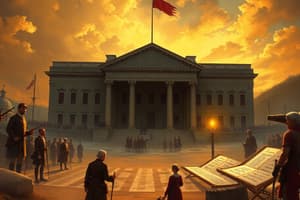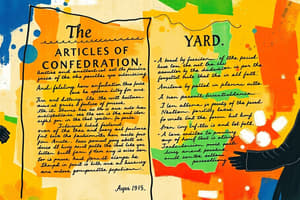Podcast
Questions and Answers
What created a loose alliance of independent states?
What created a loose alliance of independent states?
- Great Compromise
- Articles of Confederation (correct)
- Bill of Rights
- Constitution
What protects the basic liberties of citizens?
What protects the basic liberties of citizens?
Bill of Rights
What was Shay's Rebellion?
What was Shay's Rebellion?
Conflict between Massachusetts farmers and the government
What defines the principles and organization of government?
What defines the principles and organization of government?
What system of government involves citizens electing representatives?
What system of government involves citizens electing representatives?
What term describes a two-house legislature?
What term describes a two-house legislature?
What is an agreement where each side gives up some demands?
What is an agreement where each side gives up some demands?
What does it mean to make changes to a document?
What does it mean to make changes to a document?
What are rights given to you at birth that cannot be taken away?
What are rights given to you at birth that cannot be taken away?
What is the division of responsibilities among government branches called?
What is the division of responsibilities among government branches called?
Who was an Enlightenment writer that spoke about the social contract?
Who was an Enlightenment writer that spoke about the social contract?
What were the weaknesses of the Articles of Confederation?
What were the weaknesses of the Articles of Confederation?
How many free settlers were needed to become a state under the Northwest Ordinance?
How many free settlers were needed to become a state under the Northwest Ordinance?
What did the Founding Fathers learn from the Roman Republic?
What did the Founding Fathers learn from the Roman Republic?
What is the 1215 document that includes guaranteed rights called?
What is the 1215 document that includes guaranteed rights called?
What was the Great Compromise?
What was the Great Compromise?
Who argued for a strong national government?
Who argued for a strong national government?
Who stressed the importance of separating government powers?
Who stressed the importance of separating government powers?
What group emphasized the need for a Bill of Rights?
What group emphasized the need for a Bill of Rights?
How would slaves be counted for representation in Congress?
How would slaves be counted for representation in Congress?
Who were delegates to the Constitutional Convention?
Who were delegates to the Constitutional Convention?
What was the New Jersey Plan?
What was the New Jersey Plan?
Flashcards are hidden until you start studying
Study Notes
Key Concepts and Terms
-
Articles of Confederation
- Established a loose alliance among independent states, creating a weak central government.
-
Bill of Rights
- Ensures the protection of fundamental liberties for citizens, later incorporated into the Constitution.
-
Shay's Rebellion
- An armed revolt by Massachusetts farmers protesting economic injustices and government actions, highlighting weaknesses in the Articles of Confederation.
-
Constitution
- A foundational document that outlines the principles and organization of the national government.
-
Republic
- A governance system where representatives are elected by citizens to make decisions on their behalf.
-
Bicameral Legislature
- A legislature consisting of two houses, which allows for a more balanced representation in law-making.
-
Compromise
- An agreement where each party involved gives up some demands, crucial in forming the Constitution.
-
Amend
- The process of making official changes or revisions to a legal document, such as the Constitution.
-
Natural Rights
- Fundamental rights inherent at birth that cannot be transferred or revoked, underpinning the notion of individual's liberty.
-
Separation of Powers
- A governance structure dividing government responsibilities into distinct branches to prevent power concentration.
Influential Philosophers and Historical Documents
-
John Locke
- An Enlightenment thinker whose idea of a social contract emphasized the mutual agreement between the government and its citizens.
-
Weaknesses of the Articles of Confederation
- Highlighted issues such as excessive state power and the inability of Congress to regulate currency, leading to calls for reform.
-
Northwest Ordinance Requirements
- A territory needed a population of 60,000 free settlers to apply for statehood, establishing a process for orderly expansion.
-
Lessons from the Roman Republic
- Founding Fathers valued the importance of public service as demonstrated by Roman practices.
-
Magna Carta (1215)
- A significant document that introduced the concept of guaranteed rights for individuals, influencing American constitutional principles.
Major Agreements and Political Groups
-
Great Compromise
- An agreement that created a bicameral Congress with equal Senate representation and population-based House representation.
-
Federalists
- Advocates of a strong national government who believed such a structure was necessary to protect the rights of all states.
-
Baron de Montesquieu
- A philosopher advocating for the clear separation and division of government powers to safeguard freedom.
-
Antifederalists
- Opponents of the Constitution who argued for explicit protections of personal rights.
Notable Constitutional Provisions
-
Slave Representation in Congress
- Under the 3/5 Compromise, slaves would be counted as three-fifths of a person when determining a state's population for legislative representation.
-
Constitutional Convention Delegates
- Key figures like Benjamin Franklin and James Madison played vital roles in drafting the Constitution.
-
New Jersey Plan
- Proposed equal representation for all states in Congress, focusing on fairness irrespective of population size.
Studying That Suits You
Use AI to generate personalized quizzes and flashcards to suit your learning preferences.




